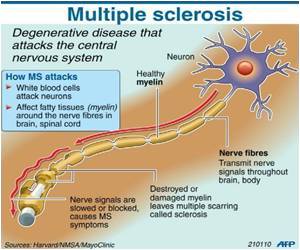
The proteins in the CSF of the new MS patients suggested physiological disruptions not only in the white matter of the brain where the myelin damage eventually shows up.
A physician has said that the reason behind the slow progress in researchers` quest for the cause of multiple sclerosis is that most of the research has targeted the wrong part of the brain.
Steven Schutzer, a physician and scientist at Rutgers New Jersey Medical School, attacked the problem from a different direction. He is one of the first scientists to analyze patients` cerebrospinal fluid (CSF) by taking full advantage of a combination of technologies called proteomics and high-resolution mass spectrometry.
He said that proteins present in the clear liquid that bathes the central nervous system can be a window to physical changes that accompany neurological disease and the latest mass spectrometry techniques allow us to see them as never before.
In this study, Schutzer used that novel approach to compare the cerebrospinal fluid of newly diagnosed MS patients with that of longer term patients, as well as fluid taken from people with no signs of neurological disease.
What Schutzer found startled one of his co-investigators, Patricia K. Coyle of Stony Brook University in New York, one of the leading MS clinicians and researchers in the country.
The proteins in the CSF of the new MS patients suggested physiological disruptions not only in the white matter of the brain where the myelin damage eventually shows up.
They also pointed to substantial disruptions in the gray matter, a different part of the brain that contains the axons and dendrites and synapses that transfer signals between nerves.
The new findings have been published in the journal PLOS ONE.
Source: Zee News

